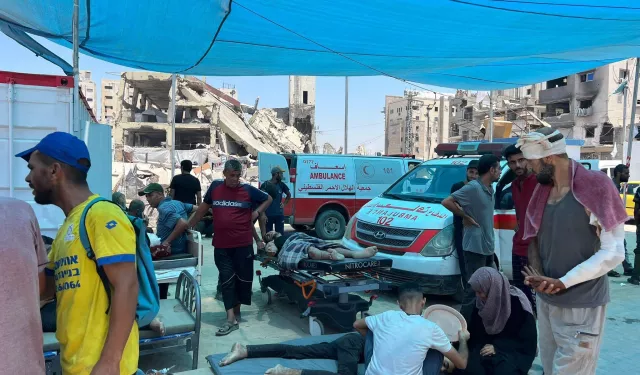More than 200 journalists, war correspondents and photojournalists from global media outlets have signed a petition demanding immediate and unsupervised access for foreign press to Gaza to independently cover the war.
The initiative, “Freedom to Report”, was started by award-winning photojournalist André Liohn, to directly challenge the ongoing restrictions that have prevented international media from entering the besieged enclave since the start of the war in October 2023.
The signatories include prominent names such as Alex Crawford of Sky News, CNN’s chief international anchor Christiane Amanpour, British war photographer Don McCullin, and broadcaster Mehdi Hasan.
The petition issued a direct call to both Israel and Hamas to lift the ban that has kept foreign journalists out of Gaza, warning that these restrictions deprive the world of an impartial account and obstruct the path to accountability.
“Unrestricted, independent access for foreign journalists is urgently needed, not only to document the unfolding catastrophe but to ensure that the truth of this war is not dictated by those who control the weapons and the narrative,” the petition read.
The petition further warned that if the belligerent parties ignore the appeal, the signatories will support professional media colleagues who “by any legitimate means, independently, collectively, or in coordination with humanitarian or civil society actors, choose to enter Gaza without the consent of the parties involved.”
While the petition identifies Gaza as the most urgent case, it also warns of a grave pattern of silencing journalists and restricting the press.
“If the democratic world truly intends to push back against this erosion of freedom, it must not turn a blind eye to Gaza. Defending press access there is defending press freedom everywhere,” the petition read.
The petition highlighted the unprecedented dangers facing journalists in Gaza, noting that nearly 200 media workers—the vast majority Palestinian—have been killed since the war began, making it the deadliest conflict for journalists on record.
According to the Gaza Government Media Office in, Israel has killed 228 Palestinian journalists since the war began, and hundreds more injured.
These perilous conditions for media workers were highlighted last month when the AFP Journalists’ Association has issued a stark warning over the dire conditions faced by its freelance correspondents in Gaza, expressing fears that its team may perish from starvation—a grim first in the agency’s 81-year history.
At the time, French foreign minister Jean-Noël Barrot urged Israel to allow international journalists into Gaza, amidst mounting reports of starvation and violence nearly 22 months into the war.
The Guardian, Washington Post and Financial Times have also signed, among 38 media figures, a statement by the International News Safety Institute (INSI) calling on Israel to allow international journalists into Gaza, and to also allow any journalist and their family who wish to leave Gaza to do so.
In June, over 160 media leaders and press freedom groups, including Al Manassa, signed an urgent open letter demanding unrestricted international media access to Gaza and protection for journalists under siege.
Coordinated by CPJ and RSF, the letter—endorsed by major outlets like Reuters, AP, CNN, and Al Jazeera—condemned Israel’s unprecedented blockade on independent reporting, which has left foreign journalists barred and local reporters facing deadly risks, with nearly 200 killed.
The coalition, spanning six continents, called on global leaders to enforce press freedom and uphold journalists’ safety under international law.
The escalating push for media access to Gaza comes as the strip faces catastrophic humanitarian conditions.
On July 23, WHO chief Tedros Adhanom Ghebreyesus described the crisis as a “man-made mass starvation,” driven by Israel’s blockade of aid deliveries.
Beyond immediate calls for access, the petition emphasized the legal protections journalists are owed under the Geneva Conventions, and called on governments and press freedom groups to take a stand in defense of press freedom.
“This is not a political statement. It is a principled stand for freedom of the press, a cornerstone of democracy and accountability, especially in times of war. Journalism cannot stop. The world has a right to know,” the petition concluded.
